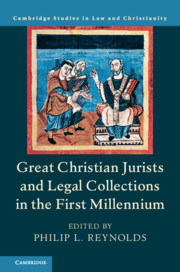Book contents
- Great Christian Jurists and Legal Collections in the First Millennium
- Law and Christianity
- Great Christian Jurists and Legal Collections in the First Millennium
- Copyright page
- Contents
- Contributors
- Preface and Acknowledgments
- Abbreviations
- Part I
- Part II
- 10 Lactantius
- 11 Ambrosiaster
- 12 Augustine of Hippo
- 13 Leo the Great
- 14 Gelasius I
- 15 Dionysius Exiguus
- 16 Benedict’s Rule
- 17 Gregory the Great
- 18 Isidore of Seville
- 19 Pseudo-Isidorus Mercator
- 20 Jonas of Orléans
- 21 Hincmar of Reims
- 22 Regino of Prüm
- 23 Burchard of Worms
- 24 New Horizons in Church Law
- Index
- References
10 - Lactantius
from Part II
Published online by Cambridge University Press: 21 June 2019
- Great Christian Jurists and Legal Collections in the First Millennium
- Law and Christianity
- Great Christian Jurists and Legal Collections in the First Millennium
- Copyright page
- Contents
- Contributors
- Preface and Acknowledgments
- Abbreviations
- Part I
- Part II
- 10 Lactantius
- 11 Ambrosiaster
- 12 Augustine of Hippo
- 13 Leo the Great
- 14 Gelasius I
- 15 Dionysius Exiguus
- 16 Benedict’s Rule
- 17 Gregory the Great
- 18 Isidore of Seville
- 19 Pseudo-Isidorus Mercator
- 20 Jonas of Orléans
- 21 Hincmar of Reims
- 22 Regino of Prüm
- 23 Burchard of Worms
- 24 New Horizons in Church Law
- Index
- References
Summary
Hailing from North Africa, Lactantius was an imperial professor of Latin rhetoric, a position that brought him to the courts of the emperors Diocletian and Constantine. This chapter explores themes in his Divine Institutes that bear on his legal thought. In addition to setting out Lactantius’s conception of religious tolerance and its influence on the emperor Constantine’s religious policy, the chapter considers the role of “divine law” in Lactantius’s work. He found the first two principles of divine law in Matt 22:36–40 and considered them equivalent to pietas and aequitas in Cicero’s thought. Just as Roman citizens were defined by their access to Roman law, so adherence to divine law, for Lactantius, constituted both Christian and Roman identity. After Augustine of Hippo rejected Lactantius’s suggestion that the law of the state could be a faithful image of the divine law, Western medieval scholars largely ignored the legal thrust of Lactantius’s arguments. Nevertheless, his advocacy of religious tolerance gained currency in recent times, when the Second Vatican Council embraced it.
- Type
- Chapter
- Information
- Publisher: Cambridge University PressPrint publication year: 2019

